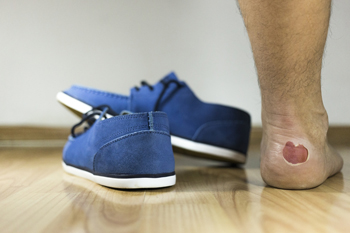Causes of Blisters
Monday, 03 December 2018 00:00 If you notice a small area on your foot filled with fluid, you may have what is referred to as a blister. The fluid acts as a natural barrier that protects the new skin from any damage or injury that may occur. Friction is generally the main cause of blisters developing on the feet and may form as a result of wearing shoes that are too tight. Other causes of blisters may originate from an insect bite, or skin conditions that may include impetigo, chickenpox or a sunburn. Research has shown the importance of letting the blister drain on its own, and this may prevent an infection from developing. There may be ways to prevent blisters from forming, and these may include wearing footwear that fits properly, dusting your feet with powder, which may aid in absorbing excess sweat, or using sunscreen. Most blisters will heal on their own, but if you are experiencing a blister that keeps reoccurring or not healing properly, it is suggested to speak with podiatrist who can advise you on proper treatment and prevention techniques.
If you notice a small area on your foot filled with fluid, you may have what is referred to as a blister. The fluid acts as a natural barrier that protects the new skin from any damage or injury that may occur. Friction is generally the main cause of blisters developing on the feet and may form as a result of wearing shoes that are too tight. Other causes of blisters may originate from an insect bite, or skin conditions that may include impetigo, chickenpox or a sunburn. Research has shown the importance of letting the blister drain on its own, and this may prevent an infection from developing. There may be ways to prevent blisters from forming, and these may include wearing footwear that fits properly, dusting your feet with powder, which may aid in absorbing excess sweat, or using sunscreen. Most blisters will heal on their own, but if you are experiencing a blister that keeps reoccurring or not healing properly, it is suggested to speak with podiatrist who can advise you on proper treatment and prevention techniques.
Blisters are prone to making everyday activities extremely uncomfortable. If your feet are hurting, contact Dr. Mark Spier of Maryland. Our doctor can provide the care you need to keep you pain-free and on your feet.
Foot Blisters
Foot blisters develop as a result of constantly wearing tight or ill-fitting footwear. This happens due to the constant rubbing from the shoe, which can often lead to pain.
What Are Foot Blisters?
A foot blister is a small fluid-filled pocket that forms on the upper-most layer of the skin. Blisters are filled with clear fluid and can lead to blood drainage or pus if the area becomes infected.
How Do Blisters Form?
Blisters on the feet are often the result of constant friction of skin and material, usually by shoe rubbing. Walking in sandals, boots, or shoes that don’t fit properly for long periods of time can result in a blister. Having consistent foot moisture and humidity can easily lead to blister formation.
Prevention & Treatment
It is important to properly care for the affected area in order to prevent infection and ease the pain. Do not lance the blister and use a Band-Aid to provide pain relief. Also, be sure to keep your feet dry and wear proper fitting shoes. If you see blood or pus in a blister, seek assistance from a podiatrist.
If you have any questions, please feel free to contact one of our offices located in Columbia and Reisterstown, MD . We offer the newest diagnostic and treatment technologies for all your foot care needs.









